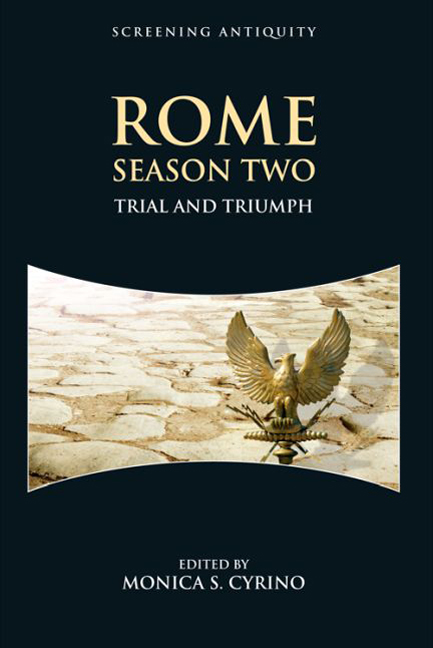Book contents
- Frontmatter
- Contents
- Series Editors’ Preface
- Editor's Acknowledgments
- Contributors
- List of Illustrations
- Episode Listing
- Cast List
- Introduction: The Trials and Triumphs of Rome, Season Two
- PART I POWER AND POLITICS
- 1 A Touch Too Cerebral: Eulogizing Caesar in Rome
- 2 Discharging Pullo and Vorenus: Veterans in Rome
- 3 Gangsterism in Rome
- 4 Class, Chaos, and Control in Rome
- 5 Earning Immortality: Cicero's Death Scene in Rome
- 6 The Triumvirate of the Ring in Rome
- 7 Jews and Judaism in Rome
- PART II Sex and Status
- Filmography
- Bibliography
- Index
1 - A Touch Too Cerebral: Eulogizing Caesar in Rome
from PART I - POWER AND POLITICS
Published online by Cambridge University Press: 07 October 2017
- Frontmatter
- Contents
- Series Editors’ Preface
- Editor's Acknowledgments
- Contributors
- List of Illustrations
- Episode Listing
- Cast List
- Introduction: The Trials and Triumphs of Rome, Season Two
- PART I POWER AND POLITICS
- 1 A Touch Too Cerebral: Eulogizing Caesar in Rome
- 2 Discharging Pullo and Vorenus: Veterans in Rome
- 3 Gangsterism in Rome
- 4 Class, Chaos, and Control in Rome
- 5 Earning Immortality: Cicero's Death Scene in Rome
- 6 The Triumvirate of the Ring in Rome
- 7 Jews and Judaism in Rome
- PART II Sex and Status
- Filmography
- Bibliography
- Index
Summary
The second season of the series Rome opens with the frantic moments immediately following Julius Caesar's assassination on the Ides of March 44 bc. The natural crux of the aftermath is the rivalry of Brutus and Mark Antony, for their speeches at Caesar's funeral are pivotal in their competing attempts to shape public opinion and rally support for their respective causes. The season premiere episode, “Passover” (episode 13), presents a narrative of these adversaries that can stand on its own terms, but a closer look reveals the writing as a complex tissue of elements engaging the audience's expectations of action, Shakespeare's culturally iconic play Julius Caesar, and Plutarch's biographies that were Shakespeare's chief sources for his play. Antony's jibe to Brutus in Rome – that his speech was “a touch too cerebral for that audience” – becomes a most metaliterary meditation on adaptation. With this in mind, let us consider the chain of reception from Plutarch to Shakespeare to twenty-first-century television as it culminates in the dramatic effect of screenwriter Bruno Heller's creative choices.
PLUTARCH
Our discussion begins with Plutarch's account of the speeches of Brutus and Antony in his Life of Brutus and Life of Mark Antony. A prolific Greek writer living under imperial Rome, Plutarch (ca. ad 46–120) composed his Parallel Lives as pairs of biographies intended to be read as comparative diptychs. In Plutarch's work, Brutus’ speech takes place immediately after the death of Caesar, and it is a reflection of the speaker's own public standing and personal dignitas (Life of Brutus 18.5–6):
When the multitude was assembled there, Brutus made a speech calculated to win the people and befitting the occasion. The audience applauding his words and crying down to him to come down from the Capitol, the conspirators took heart and went down into the forum. The rest of them followed along in one another's company, but Brutus was surrounded by many eminent citizens, escorted with great honour down from the citadel, and placed on the rostra. At sight of him the multitude, although it was a mixed rabble and prepared to raise a disturbance, was struck with awe, and awaited the issue in decorous silence. Also when he came forward to speak, all paid quiet attention to his words.
- Type
- Chapter
- Information
- Rome Season TwoTrial and Triumph, pp. 13 - 24Publisher: Edinburgh University PressPrint publication year: 2015



